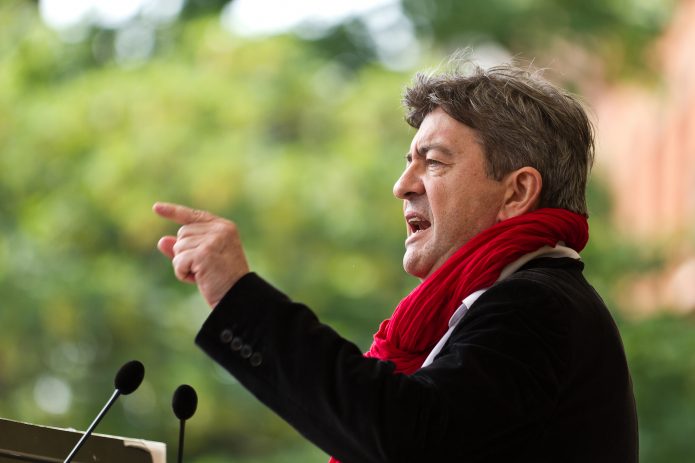
(Photo: Wikipedia Commons)
Would your life be better or worse if our highways and byways had no speed limits? Easy question. We all see value in speed limits, even those of us with an occasional lead foot.
But what about limits on income? Would your life be better or worse if we limited how much any one individual could pocket in a year?
At the outset of this year’s French presidential campaign, no one “in the know” saw Mélenchon finishing much above a distant fifth. But the veteran activist’s candidacy electrified a much wider swatch of the French public than expected. He finished in a tight horserace for third, just a few percentage points behind the race’s frontrunner.
Jean-Luc Mélenchon, the most surprising candidate in the French presidential election’s April 23 first-round, ran a campaign that put that question before French voters. The 65-year-old former French lawmaker wants individual income over 400,000 euros, about $430,000, subject to a 100 percent tax.
What made that finish all the more remarkable: the withering torrent of abuse all the leading candidates — and France’s top 1 percent overall — leveled against Mélenchon in the campaign’s final weeks as polls showed him rapidly gaining ground.
One conservative daily, Le Figaro, hammered Mélenchon as “the apostle of revolutionary South American dictators.” The campaign frontrunner mocked Mélenchon as a “communist revolutionary.” The leader of France’s top business group, Pierre Gattaz, labeled Mélenchon an “economic disaster.” His taxes, the business group added, will “crush” France.
Noticeably absent from these verbal assaults: any attempt to engage Mélenchon in real debate on his bold policy prescriptions.
Mélenchon’s rivals never bothered to spell out just why they support limitless individual income over limited individual income. They never made the effort to explain why they feel letting individuals essentially keep as much income as they can grab will leave France and the French better off.
Mélenchon, for his part, took the time to explain why he felt that capping income would leave even the capped better off.
“Being a billionaire does nothing for personal happiness,” he pointed out. “It’s just an accumulation of worries that we’d want to take away.”
Mélenchon’s advocacy for what amounts to a maximum wage is tapping into a deep egalitarian current in French political life. In 2013, for instance, one public opinion poll found the French supporting a “maximum wage” for corporate chief execs by an 83 to 16 percent margin.
American fans of grand fortune might feel tempted to dismiss this support for income limits as just a “French thing.” But we have our own maximum wage tradition in the United States.
In 1942, President Franklin Roosevelt proposed a cap on individual income at $25,000, about $375,000 in today’s dollars. Subsequent Gallup polling found that a plurality of the American people supporting FDR’s cap notion.
Roosevelt in the end didn’t get the 100 percent top tax rate he sought. But he did get a 94 percent top rate on income over $200,000 — and that rate would help launch the United States on to the best quarter-century of shared prosperity the American people had ever known.
What will the French people end up getting from Jean-Luc Mélenchon’s efforts? We’ll see.
